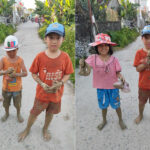Economic background plays a significant role in shaping parenting styles and the opportunities provided to children. Affluent families tend to offer their children a wider range of educational and developmental opportunities. In contrast, families with limited financial resources may struggle to meet children’s basic needs, including education and healthcare.
Each family has its unique cultural values, which influence parenting approaches. In many cultures, respect and obedience are highly valued, leading to stricter parenting styles. On the other hand, families with a more open approach encourage children to freely express their opinions and emotions. These differences can lead to varied outcomes in children’s personalities and behaviors.

Illustration.
Parental involvement is another critical factor. Parents who dedicate time and energy to their children tend to foster deeper relationships, making their children feel loved and accepted.
Successful parenting requires a clear understanding of one’s circumstances and a commitment to creating a positive and supportive environment for children’s development.
By adapting parenting methods to family circumstances, children can thrive physically and mentally, laying a solid foundation for their future.
For instance, when discussing children from “rich and spoiled” or “poor and neglected” backgrounds, we must consider not only their material conditions but also how these circumstances impact their psychology and behavior.

Psychologist Quang Thi Mong Chi

How does family economic background influence parenting styles?
From a psychological perspective, family economic background is a significant factor in shaping parenting styles. In low-income families, parents often face survival pressures, resulting in limited time for their children and restricted resources for education, including books, extracurricular activities, and living environment.
This situation may lead to a practical, disciplined, frugal, and self-reliant parenting approach. However, if economic pressure becomes overwhelming, parents may experience stress, irritability, and impatience, negatively impacting the quality of emotional bonding within the family.
In contrast, affluent families can usually meet their children’s material needs and provide opportunities for diverse educational activities and skill development. This environment can broaden children’s horizons, boost their confidence, and encourage self-discovery. However, if not handled skillfully, over-fulfillment can reduce children’s motivation to strive, hinder their self-reliance, and foster an entitlement mentality.
It’s important to remember that economics is just one factor. What truly determines the quality of parenting is how parents utilize their available resources. A family may not be wealthy, but if they provide a caring environment, proper guidance, and practical experiences, they can raise resilient and appreciative children.

What are the differences between “rich and spoiled” and “poor and neglected” children?
Rich and Spoiled: Parents believe that “money is readily available, and children should just enjoy it.” Poor and Neglected: Parents think, “I’ve endured hardship, and my child shouldn’t have to.”
Both “rich and spoiled” and “poor and neglected” scenarios stem from a desire to protect or provide for children, but the methods inadvertently deprive them of essential experiences that teach responsibility and foster maturity.
In the “rich and spoiled” scenario, when parents believe that “money is readily available, and children should just enjoy it,” children grow up in an environment where most of their material needs are met without any effort on their part. This can lead to a lack of awareness about the value of labor, deficient self-reliance skills, and an entitlement mentality.
Psychologically, these children may develop a sense of privilege, struggle to accept failure or limitations, and easily give up when faced with challenges. On the other hand, “poor and neglected” situations often arise from a mentality of compensation: “I’ve endured hardship, and my child shouldn’t have to.”
Parents are willing to make sacrifices and fulfill their children’s wishes, even if it exceeds their means or is unnecessary. Consequently, children may develop demanding habits, lack endurance in the face of adversity, and fail to appreciate hard work. Additionally, if parents are overly indulgent, children may lack clear boundaries, leading to impulsive behavior or a disregard for discipline.
The difference lies in the nature of the spoiling. In “rich and spoiled,” it is associated with a sense of excess and power, while in “poor and neglected,” it stems from a mentality of compensation and indulgence. Nonetheless, both scenarios highlight the importance of parenting based on principles, life skills, and independence rather than solely on material possessions or self-sacrifice.

How can parents from diverse economic backgrounds provide their children with optimal development opportunities?
To provide children with the best development opportunities, regardless of economic background, parents should focus on optimizing available resources and actively creating diverse learning and experiential environments.
This doesn’t solely depend on financial capabilities but, more importantly, on how parents guide, organize, and accompany their children through their journey to adulthood.
Firstly, parents should establish clear and comprehensive development goals for their children, encompassing knowledge, skills, physical health, emotional intelligence, and character. With a clear direction, wealthy or poor families can choose appropriate methods to achieve these goals without falling into the trap of costly and unnecessary activities or courses.
Secondly, maximize the utilization of existing resources. Affluent families can invest in quality courses, extracurricular activities, and travel experiences but should also encourage children’s self-exploration and life skill development. Less fortunate families can seek free or low-cost opportunities like public libraries, youth clubs, community-organized hobby classes, volunteer work, or scholarship programs. Maintaining a spirit of learning and discovery is crucial, regardless of economic constraints.
Additionally, parents should involve their children in daily life experiences, from household chores and self-care to community activities. These experiences foster self-reliance, problem-solving, cooperation, and communication skills—all of which are foundational for future success.
Emphasize emotional intelligence and values. Regardless of circumstances, parents can teach children empathy, respect, perseverance, and responsibility. These qualities, independent of financial status, determine how children confront challenges and seize opportunities in the future.
Lastly, lead by example and accompany your children. Children learn the most by observing their parents’ behavior. When parents live with purpose, discipline, a love for learning, and optimism in the face of adversity, children naturally adopt these traits as their life compass.

How can parents create a healthy family environment for their children, regardless of economic circumstances?
Regardless of economic status, parents can create a healthy family environment by focusing on building a loving, safe, and clearly directed space for their children.
Material factors are merely a supporting foundation. What truly defines the quality of the family environment is how parents connect, communicate, and accompany their children as they grow.
Firstly, children need to be nurtured in a consistent environment of love and care. This doesn’t have to be expressed through expensive gifts but can be as simple as sharing meals, listening to their stories from school, offering a hug when they’re sad, or engaging in a joint activity during the weekend. This bond fosters a sense of security and trust, empowering children to confidently explore the world.
Secondly, a healthy family environment requires clear boundaries and rules. When children understand what is acceptable and what is not, they can develop self-control and a sense of responsibility. Discipline here doesn’t mean punishment but guidance, explanation, and helping children understand the natural consequences of their actions. Consistency in enforcing these rules provides children with a stable and reliable living environment.
Additionally, encourage self-reliance and problem-solving skills. Children should be given age-appropriate tasks and the freedom to make decisions within safe boundaries, learning from both their successes and failures. This approach enhances their coping skills, adaptability, and resilience in the face of challenges.
Lastly, open and respectful communication is the foundation for long-lasting connections. When parents respect their children’s opinions and emotions and share their thoughts and feelings honestly, children learn healthy communication skills and develop respect for others.
In conclusion, a healthy family is not solely measured by material wealth but by the love, respect, and clear principles that parents instill in their children. Whether rich or poor, a family can be a safe haven for children’s holistic development when filled with love, respect, and clear guidelines.
Nurture vs Nature: What Truly Shapes Your Child’s Personality?
“For years, we believed that a child’s upbringing was the primary determinant of their future. However, recent studies have revealed a surprising truth: our genes play a more significant role in shaping our personalities and traits. This newfound understanding has left many parents questioning the conventional wisdom and seeking ways to support their children’s development in light of this new knowledge.”






































